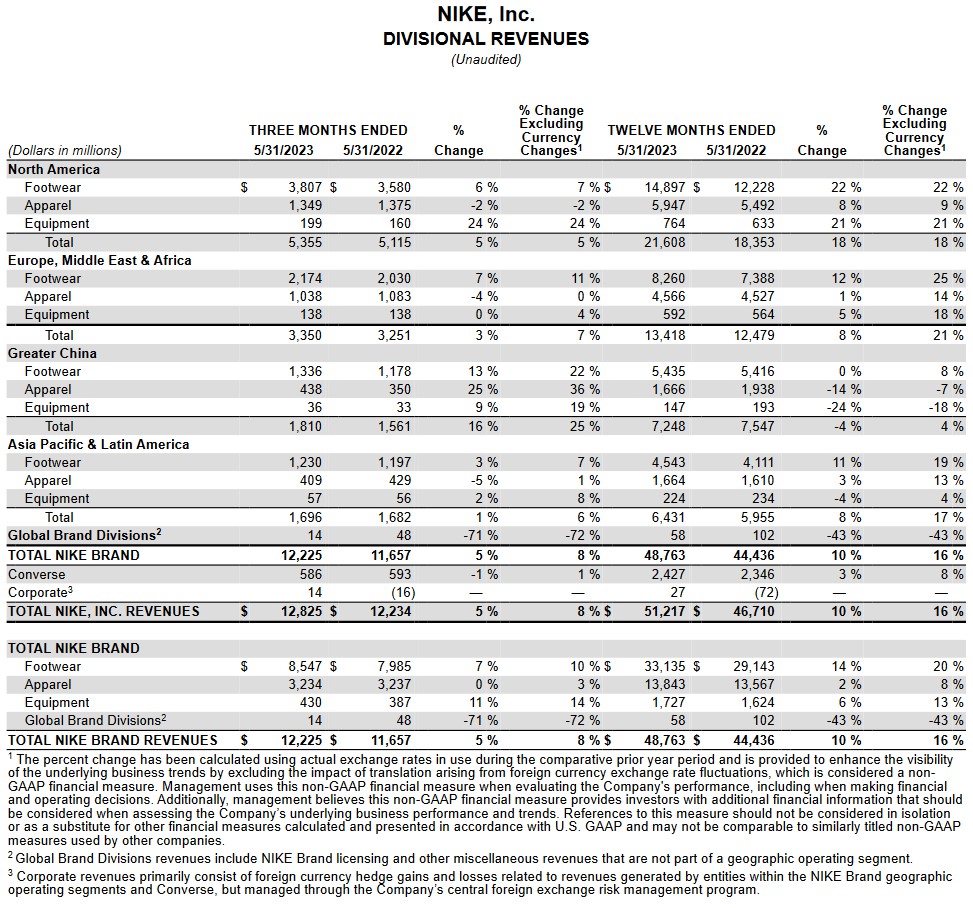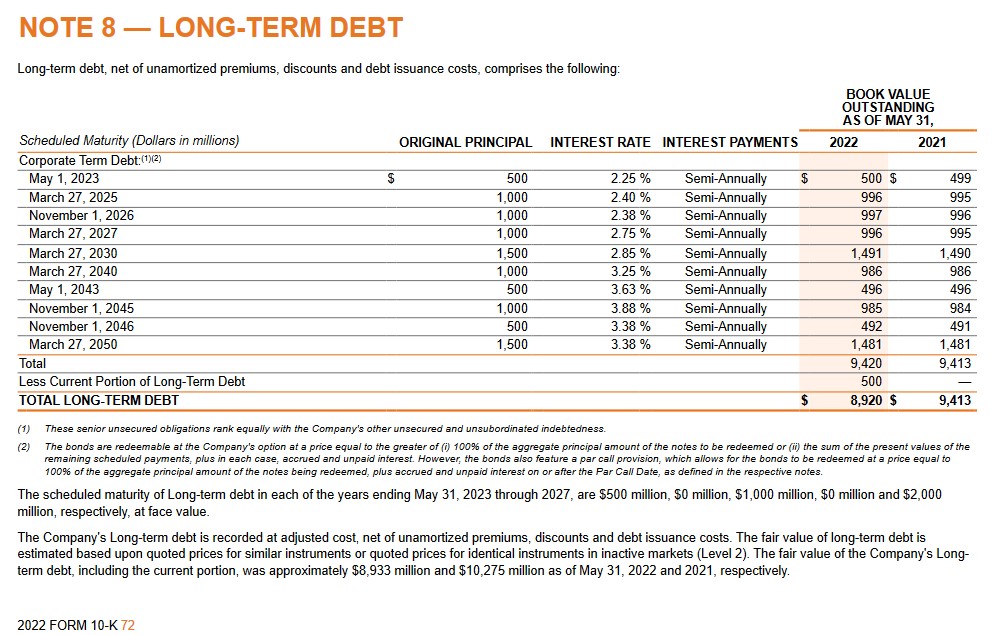
Nike (NKE) shareholders have experienced sub-par total investment returns over the past 5 years (an average annual total return of ~7.3% versus ~11.4% for the S&P 500 when dividends are reinvested). NKE’s average annual total return drops to (18.42%) versus ~2% for the S&P 500 if we change the timeframe to 2 years. Change the timeframe to 1 year, and NKE’s average annual total return is (2.2%) versus ~14.6% for the S&P 500.
Looking at these returns, an investor would be justified in wondering whether NKE is a worthwhile long-term investment.
Investors, however, need to step back and put things in perspective.
First and foremost, the S&P500 returns over the past year are distorted because of the performance of Microsoft (MSFT), Apple (AAPL), Nvidia (NVDA), Alphabet (GOOG), Meta (META), and Amazon (AMZN).
In the first half of 2023, the performance of the Technology sector is in marked contrast to that of other sectors:
- Technology: 38%
- Industrials: 8%
- Materials: 6%
- Consumer Staples: 1%
- Healthcare: (3%)
- Financials: (3%)
- Utilities: (5%)
- Energy: (8%)
Secondly, past performance is not indicative of future performance.
Given that NKE released its Q4 and FY2023 results on June 29 and I have not reviewed it since this July 5, 2022 post, I take this opportunity to revisit this existing holding.
Nike – Financials
Q4 and FY2023 Results
NKE’s most recent results are accessible in this Earnings Release.
In FY2023, NKE reported a 4% YoY decline in revenue from the Chinese market. However, NKE posted 16% sales growth (~14.8% of brand revenue) in Q4. The Q4 results are somewhat encouraging given concerns about NKE’s market share loss to local brands and the pace of the region’s economic recovery.
In North America, NKE reported an 18% YoY growth in revenue. YoY growth in Q4, however, was only 5%.
In Europe, Middle East & Africa, NKE reported 8% YoY revenue growth but this slowed to 3% in Q4.
We also see that in Asia Pacific & Latin America, NKE reported 8% YoY revenue growth but this slowed to 1% in Q4.
YoY Footwear and Apparel revenue was also weak in Q4 relative to YoY growth in FY2023.

Source: NKE – Form 8-K June 29, 2023
NKE’s FY2023 Form 10-K is not yet available as I compose this post. I, therefore, include NKE’s long-term debt schedule from its FY2022 Form 10-K (note the highly attractive interest rates!).
NKE’s long-term debt at FYE2022 was $9.42B of which $0.5B was a current portion of long-term debt (CPLTD). This CPLTD was repaid in full in FY2023 thereby leaving NKE with $0 in CPLTD and $8.927B in LTD at FYE2023.
Looking at the schedule of LTD below, we see that NKE has no long-term debt obligations maturing in FY2024.

Source: NKE – FY2022 Form 10-K
Free Cash Flow (FCF)
NKE is highly profitable and repeatedly generates strong Free Cash Flow ($1.261B, $2.434B, $2.133B, $3.717B, $2.256B, $2.741B, $3.927B, $4.784B, $1.399B, $5.962B, and $4.43B in FY2012 – FY2022). The FY2023 consolidated statement of cash flow is not yet available as I compose this post. In the first 9 months of FY2023, however, NKE generated ~$2.9B of FCF (Q3 2023 Form 10-Q).
FY2024 Outlook
On the FY2023 earnings call with analysts, management indicates NKE is entering FY2024 with a robust product innovation pipeline, healthy inventory, and a normalized flow of supply. NKE, however, is closely monitoring the macro environment, consumer behaviour, and retail trends.
Expectations are for FY2024 revenue to grow mid-single digits, led by Nike Direct. This includes ~4 points of headwinds from the prior year from wholesale shipment timing and accelerated liquidation activities.
Based on current FX spot rates, NKE does not expect any material currency translation impact on FY2024 revenue.
Management is also projecting 140 – 160 bps gross margin expansion. This reflects the beginning of the recovery from transitory headwinds, including more favourable ocean freight rates starting halfway through Q2, and a modest improvement in markdowns versus the prior fiscal year.
Continued structural gains from focusing on price value, including low single-digit price increases in FY2024, plus ongoing benefits from the shift to a more direct business are projected. This, however, is expected to be partially offset by higher product costs, with inflation causing higher labour and fulfillment expenses in the supply chain.
Expectations are for selling, general and administrative expenses (SG&A) to grow slightly above revenue. This is attributed to NKE’s increased investment in:
- demand creation to support key global sports moments and product launches; and
- capabilities to transform NKE’s operating model for greater speed and effectiveness.
The plan, however, is to continue to manage SG&A to remain below pre-pandemic levels as a percentage of revenue.
Other income and expense, including net interest income, is expected to be $225 – $275 million of income for the year.
The effective tax rate in FY2024 is expected to be similar to ~18% in FY2023.
In Q1, NKE Q1 revenue growth is projected to be between flat and up low single digits. This reflects management’s decision to tighten first-half buys and restrain marketplace inventory.
SG&A in Q1 is expected to grow low double-digits on a reported basis. This will be driven by increased demand creation investments around the Women’s World Cup and transformational investments to drive efficiency, including the activation of the next stages of NKE’s Enterprise Resource Planning (ERP) implementation in North America.
Credit Ratings
NKE’s domestic senior unsecured long-term debt credit ratings remain unchanged from the time of my last review; Moody’s assigns an A1 rating while S&P Global assigns an AA- rating.
Moody’s rating is the top tier of the ‘upper-medium grade’ investment-grade category. S&P Global’s rating is one notch higher at the bottom tier of the high-grade investment-grade category.
Moody’s rating defines NKE as having a STRONG capacity to meet its financial commitments. It is, however, somewhat more susceptible to the adverse effects of changes in circumstances and economic conditions than obligors in higher-rated categories.
S&P’s rating defines NKE as having a VERY STRONG capacity to meet its financial commitments with its rating differing from the highest-rated obligors only to a small degree.
Dividend and Dividend Yield
NKE has increased its dividend payouts for 21 consecutive years.
In Q4, NKE distributed ~$0.524B in dividends, an increase of ~9% from the prior year. In FY2022, it distributed ~$2B, an increase of ~10% from FY2022.
When I wrote my July 2021 review, NKE’s $1.10 annual dividend yielded ~0.68% based on the current ~$162 share price.
At the time of my March 22, 2022 post, NKE’s share price was ~$133. Based on NKE’s $0.305 quarterly dividend, the dividend yield was ~0.09%.
When I wrote my July 5, 2022 post, shares were trading at ~$101. Based on the current $0.305 quarterly dividend, the dividend yield was ~1.2%.
On November 15, 2022, NKE declared a $0.34 quarterly dividend and on July 5, 2023, it will be distributing its 3rd quarterly dividend at this level. Using the current ~$104.50 share price, the dividend yield is ~1.3%.
Looking at NKE’s recent dividend increases, it is not unreasonable to envision NKE will declare in mid-November a ~$0.03 increase to its quarterly dividend. If this materializes, then the four next quarterly dividends will amount to ~$1.45 ($0.34 + ($0.37 x3)). Using the current ~$104.50 share price, the forward dividend yield would be ~1.4%.
Historically, the lion’s share of NKE’s total return has been by way of capital appreciation. Given NKE’s challenges in recent years, there has been no capital appreciation to offset the razor-thin dividend yield. This, however, is one of the risks investors need to consider when investing.
NKE has been a prolific buyer of its issued and outstanding shares.
In Q4, NKE repurchased 11.5 million shares for ~$1.4B as part of the four-year, $18B program approved by the Board in June 2022.
Throughout FY2023, NKE repurchased 50 million shares for $5.5B. Of this total, 6.5 million shares were repurchased for $0.7B under the previous four-year, $15B program approved by the Board of Directors in June 2018. The remaining 43.5 million shares repurchased for $4.8B were retired under the current four-year, $18B program approved by the Board in June 2022.
The weighted average number of outstanding shares in FY2011 – 2023 (in millions rounded) is 1,943, 1,879, 1,833, 1,812, 1,769, 1,743, 1,692, 1,659, 1,618, 1,592, 1,609, 1,611, and 1,570. The diluted weighted average common shares outstanding in Q4 2023 is 1,556.
Valuation
NKE’s FY2012 – FY2022 diluted PE is 21.86, 26.75, 28.62, 30.34, 22.39, 27.08, 55.74, 35.42, 79.93, 43.75, and 33.05. In FY2023, NKE generated $3.23 in diluted EPS and with shares trading at ~$104.50, the trailing PE is ~32.4.
When I wrote my March 22 post, NKE shares were trading at ~$133. Adjusted diluted EPS estimates from all the brokers which cover NKE had yet to be provided but using what was available, these were the valuations based on what was currently available.
- FY2022 – 34 brokers – mean of $3.69 and low/high of $3.42 – $4.01. Using the mean estimate, the forward adjusted diluted PE is ~36.
- FY2023 – 34 brokers – mean of $4.64 and low/high of $4.10 – $5.19. Using the mean estimate, the forward adjusted diluted PE is ~28.6.
- FY2024 – 23 brokers – mean of $5.48 and low/high of $5.10 – $6.00. Using the mean estimate, the forward adjusted diluted PE is ~24.2.
At the time of my July 5, 2022 post, shares were trading at ~$101. NKE’s valuation based on adjusted diluted earnings estimates was as follows:
- FY2023 – 32 brokers – mean of $3.93 and low/high of $3.46 – $4.85. Using the mean estimate, the forward adjusted diluted PE is ~25.7.
- FY2024 – 30 brokers – mean of $4.73 and low/high of $4.00 – $5.59. Using the mean estimate, the forward adjusted diluted PE is ~21.4.
- FY2025 – 12 brokers – mean of $5.66 and low/high of $5.07 – $6.51. Using the mean estimate, the forward adjusted diluted PE is ~17.8.
With shares currently trading at ~$104.50, NKE’s valuation based on adjusted diluted earnings estimates is:
- FY2024 – 32 brokers – mean of $3.74 and low/high of $3.48 – $4.00. Using the mean estimate, the forward adjusted diluted PE is ~28.
- FY2025 – 32 brokers – mean of $4.40 and low/high of $3.90 – $5.0. Using the mean estimate, the forward adjusted diluted PE is ~23.75.
- FY2026 – 13 brokers – mean of $5.11 and low/high of $4.59 – $5.81. Using the mean estimate, the forward adjusted diluted PE is ~20.5.
Final Thoughts
On June 27, 2016, I initiated a 500-share NKE position @ ~$52/share. For tax planning reasons, I transferred these shares to another taxable account in December 2020 which triggered a taxable capital gain and resulted in a new average cost.
On March 11, 2022, I acquired another 100 shares @ ~$123.
These shares plus another 22 shares acquired through automatic dividend reinvestment gives me a total of 622 shares which are held in a ‘Core’ account within the FFJ Portfolio. My daughter also holds NKE shares in a taxable account but I do not disclose details surrounding these shares.
When I recently completed my Mid 2023 Investment Holdings Review, NKE was not a top 30 holding.
I am looking to add to my exposure in great companies whose shares are out of favour with investors. NKE has certainly fallen out of favour but if higher interest rates in some of NKE’s largest markets begin to place a greater strain on consumers, one has to wonder whether NKE sales will come under pressure.
I do not think its current forward valuation justifies the current share price. A share price below the mid $90s is the level at which I would consider adding to my exposure.
I wish you much success on your journey to financial freedom!
Note: Please send any feedback, corrections, or questions to finfreejourney@gmail.com.
Disclosure: I am long NKE.
Disclaimer: I do not know your circumstances and do not provide individualized advice or recommendations. I encourage you to make investment decisions by conducting your own research and due diligence. Consult your financial advisor about your specific situation.

